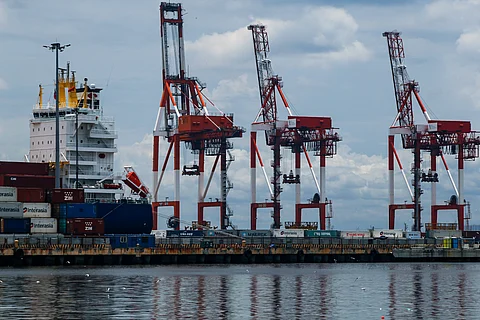
- NEWS
- the EDIT
- COMMENTARY
- BUSINESS
- LIFE
- SHOW
- ACTION
- GLOBAL GOALS
- SNAPS
- DYARYO TIRADA
- MORE

US President Donald Trump delayed for another week, to 7 August, the imposition of reciprocal tariffs on most countries, including the Philippines, in a minor reprieve that opens the door to further negotiations.
New tariffs were, however, unveiled on nearly 70 countries, as well as a blistering 35 percent on neighbor Canada.
Duties were raised from the current 10-percent level imposed in April when he unleashed “reciprocal” tariffs, citing unfair trade practices.
Those that managed to strike deals with Washington to avert threatened steeper levies included Vietnam, Japan, Indonesia, the Philippines, South Korea and the European Union.
The Department of Trade and Industry (DTI) maintained that negotiations are continuing to persuade the US to further reduce the 19-percent tariff on the country.
In an executive order signed by Trump on Thursday (US time), the tariff measures will take effect a week after the original 1 August start.
“On the part of the Philippine government, we will continue with our talks with the US and hopefully we can come up with a mutually beneficial deal as soon as possible,” Trade and Industry Secretary Cristina Roque said in a Viber message.
“In the meantime, we will continue to expand our trade network to provide more business opportunities and enhanced market access for our exporters,” she added.
The United States remains the country’s largest export destination with sales soaring by 35.2 percent to $1.21 billion from $898.38 million a year ago.
DTI–Export Marketing Bureau (EMB) Director Bianca Pearl Sykimte said the country’s strong performance, particularly in the US market, may partly reflect accelerated deliveries in anticipation of potential tariff adjustments.
“While this contributed to the June surge, it also underscores the importance of diversifying our export markets. We are actively working to support sectors that are heavily reliant on the US by opening new trade avenues and strengthening our presence in emerging and strategic markets,” Sykimte said.
Roque cannot divulge other details concerning the negotiations as they are signatories to a non-disclosure agreement—a gag order for four years, a DTI source said.
Not in our control
Earlier on Friday, Roque told reporters on the sidelines of the National Retail Conference and Expo 2025 at the SMX Convention Center: “We are always hoping for what’s best for our country, but it’s beyond our control. We are just really waiting. However, we are ready to get started, and to those that will be affected we are ready to assist them to give them other markets, both globally and locally.”
She said free trade agreements (FTA) that are set to be signed in the coming months would greatly help exporters.
“The UAE-CEPA (United Arab Emirates–Comprehensive Economic Partnership Agreement), for example, only needs to be signed. It’s already done. We are also pushing for an FTA with Israel and Chile, which we are hoping to finish this year,” she said.
She added, “Right now, we are aggressive on these FTAs. We have to think that the US is not the only market in the world. This must be a learning experience for us. It is hard to get a better deal with the US, I am not sure.”
Once signed, the UAE-CEPA would be the Philippines’ first free trade agreement (FTA) in the Middle East.
Retailers hopeful
Meanwhile, the Philippine Retailers Association (PRA) said that although their industry did well in the first half of the year, the tariff uncertainty remains a roadblock and they are being cautiously optimistic in the next half of 2025.
“This tariff issue with the US still has to evolve and we need to see how this would affect the economy and the retail industry. Filipino consumers are coming out and spending, as malls remain full,” Roberto Claudio, former president of the PRA, said.
“Hopefully, in the next two years or towards the end of the term of the President, we will see a Philippine retail industry that is continuously growing,” he added.
Varying levels
The new steeper tariff levels listed in an executive order signed by Trump vary by trading partner and go as high as 41 percent. Any goods “transshipped” through other jurisdictions to avoid US duties would be hit with an additional 40-percent tariff, the order said.
Trump had warned of trade consequences for Canada after Prime Minister Mark Carney announced at the UN General Assembly plans to recognize a Palestinian state in September.
Trump’s order cited Canada’s failure to “cooperate in curbing the ongoing flood of fentanyl and other illicit drugs” as well as its “retaliation” against his measures.
Carney said his government was “disappointed” with the hike, citing its efforts to crack down on fentanyl and increase border security.
Among other tariff levels adjusted in Trump’s latest order, Switzerland now faces a higher 39 percent duty.
The tariff on Taiwanese products was revised down to 20 percent from 32 percent, but its President Lai Ching-te vowed to seek an even lower level. With AFP.
